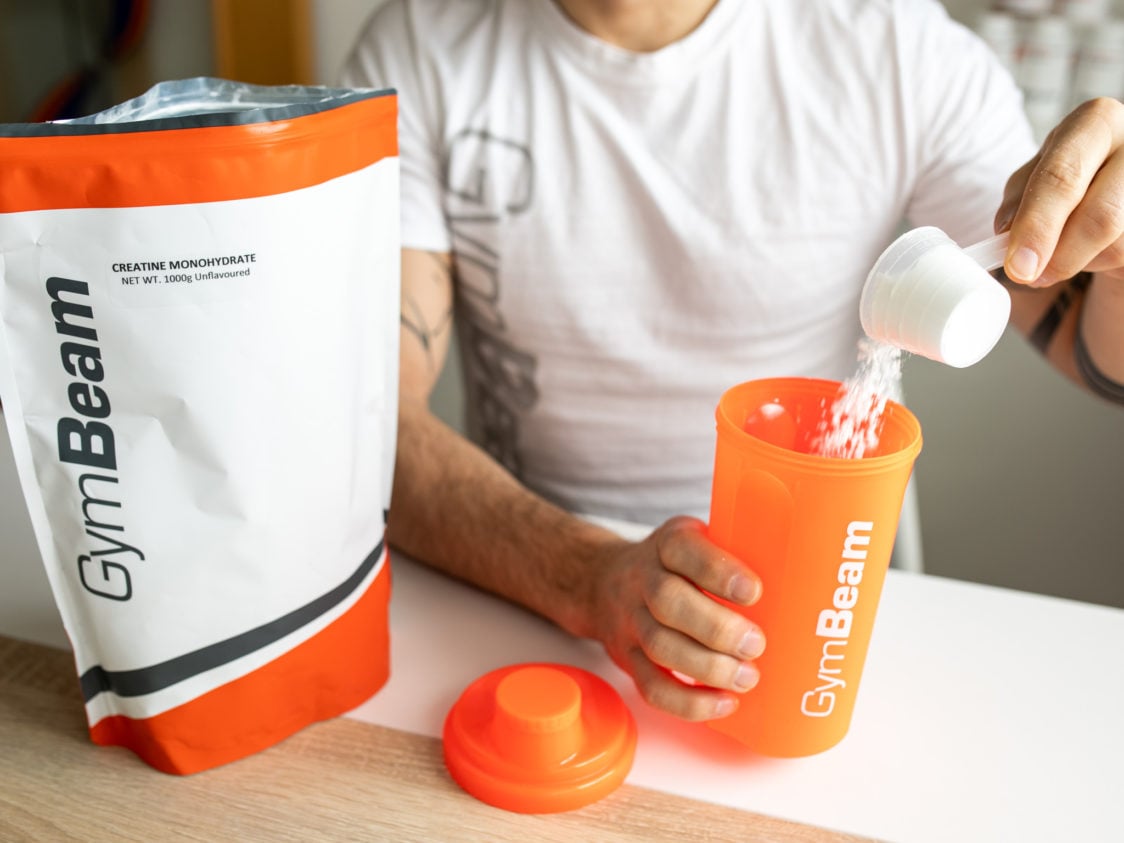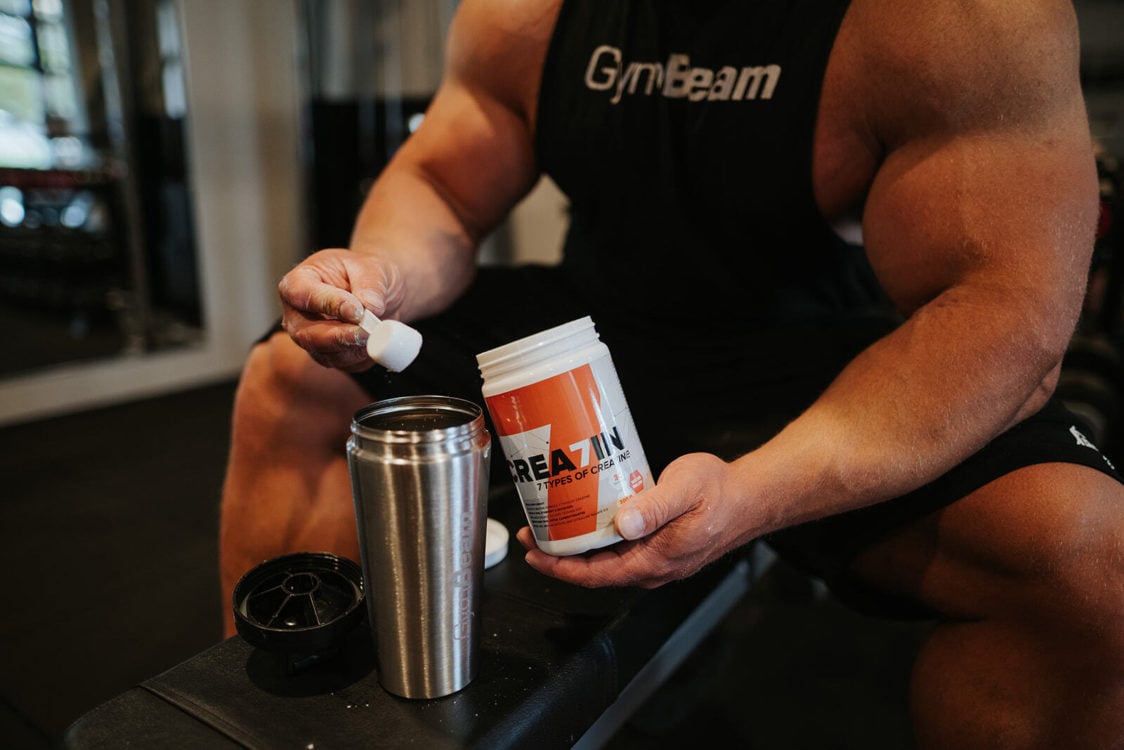Table of Contents
Creatine is a very popular supplement for many athletes, which is indispensable part of their nutritional plan. However, we may also come across claims which attribute to it various amazing effects, which quickly turn from scientific facts into fantasies.
You may have encountered the false claim that creatine has the same effect on your body as steroids or that it helps build muscle without you having to exercise. The second myth in particular sounds really great, but even though creatine is beneficial, it can’t work miracles. That is why today we will discuss its effects from a scientific point of view.
Real vs. scientific facts about creatine
Creatine is a molecule that is produced in the body from the amino acids called arginine, methionine and glycine. It is primarily formed in liver, while kidneys and pancreas also have a smaller share in its production. You can find it in specific foods and its biggest source is meat and fish. [1][19]
About 95% of creatine is stored in the muscles. The remaining 5% is found in the brain, kidneys and liver. The role of creatine is to help your muscles produce energy when lifting heavy weights or when performing a high intensity exercise. [2] [3]
Key benefits of creatine include [7] [14] [15] [16] [20]:
- supports high-intensity training
- helps build muscle mass
- helps muscle cells produce more energy
- can contribute to muscle growth
- can improve brain function
- has potential antidepressant effects
- has possible positive effects on sicknesses
The role of creatine in the process of increasing energy
Adenosine triphosphate (ATP) is a substance that plays a key role in muscle metabolism and function. It acts in our body as the most basic form of energy, concentrated in cells. It is important for intense exercise and other activities that require quick movement, such as sprints, jumping or HIIT training. [4]

Our body is only able to store the energy from ATP for a few seconds. The value mentioned most often is 8 to 10 seconds of high-intensity activity. After that the energy is resynthesized, but its amount is not high enough to cover the entire performance. In most cases, it is only recovered when we are in the resting state.
Exercise alone may require higher consumption of ATP per second than our body can produce. This manifests itself, for example, in the fact that we can fully sprint for only a few seconds. Then our ATP energy is depleted. This is where creatine bound to the phosphate anion comes into action. Together they create the so-called creatine phosphate, which is used to produce a new supply of energy from ATP. In reality, creatine can help give more intense performance over a longer period of time and thus delay the depletion of ATP associated with decreased performance. [5] [6]
The most common myths about creatine
Creatine is not only one of the most popular supplements, but also one of the most misunderstood, despite the fact that it has been studied more than any other nutritional supplement. There are various myths about it that we would like to disprove. Let’s take a look at some of the false claims about creatine:
Myth no.1: Creatine has the same effect on our body as anabolic steroids
Creatine can help build muscle mass and increase strength. However, according to research by the University of Leuven in Belgium, it does not change anabolic hormonal responses to training. For the body, it is one of the natural substances, which only increases the energy reserves in the body. This allows us to train more intensely and harder. As a result, its effect can be reflected in better training results or a stronger impulse for muscle growth. [8]
Myth no.2: Creatine helps you build muscle without exercise
Scientists confirmed that creatine provides best results when combined with strength training. Some improvement without any exercise was shown only in children with muscular dystrophy. [9]
Myth no.3: Creatine is not safe
Many studies on creatine safety have shown no significant evidence that it should cause dangerous side effects. [10]
Myth no.4: Creatine causes hair loss
Studies show that creatine use is completely safe and does not cause any problems for healthy individuals. This also applies to the myth of hair loss. [26]
If you are interested in myths about creatine from a more detailed point of view, we have discussed the most common ones in article 4 Myths and Facts About the Side Effects of Creatine.
Creatine monohydrate as the uncrowned king
When we talk about the best creatine, many think of a monohydrate. It should be noted that quite rightly so. It is the best known and most common form of creatine. It is the subject in most scientific research, which makes it the most effective.
It is the monohydrate that is associated with the most common beneficial effects, such as improving performance during exercise. It is a form of creatine that is bound to one molecule of water. That is where it got its name – monohydrate. It contains about 90% pure creatine and is one of the cheapest. As its disadvantage may be considered the relatively low solubility in water. [11] [13]

How to use creatine monohydrate to achieve the best possible results
You can use creatine in cycles, but it’s not necessary. It is most often used in two ways:
- In the initial phase 20 g daily, for 5-7 days. Later 3-5 g per day to maintain its increased level in the body.
- Without the initial phase, i.e. 3-5 g per day long-term without the need for a break.
Research shows that both methods have the same effect on increasing creatine levels. However, the first one is faster because it supplies the creatine to your muscles sooner. As a result, you can benefit from it sooner for any of your sports performances. The benefits you can get from creatine depend on its current stores in your muscles.
In reality, this means that those who have high stores of creatine from foods like red meat may experience smaller effects of supplementation. However, if the creatine content in your muscles is low, the effects can be really significant. Vegetarians and vegans could also benefit from its supplementation, as their diet does not contain animal foods that are naturally rich in creatine. [12] [13]
Other forms of creatine
Each form of creatine has a different composition, solubility and degree of efficacy. It can be micronised or mechanically processed to improve water solubility. Theoretically, better creatine solubility could improve your body’s ability to absorb it. Further dissimilarities in different forms can be found in the added substances.
Some may contain various additives to increase its absorption, for example. As a result, they are slightly more effective. Importantly, all forms of creatine have the same effect in our body, which are contributing to muscle growth, strength increase and helping to produce energy from ATP. [18] [19] [21]
You can also come across a specific form of creatine – Creapure. It is 100% pure, laboratory-tested creatine, which is produced in Germany. It is certified and also suitable for vegans. [22]
Another popular form is also creatine hydrochloride (HCl). It is created by a combination of creatine and a hydrochloride molecule. It offers excellent solubility, which is a big advantage. According to studies, it is up to 38 times more soluble than the monohydrate. [23]
You might be interested in these products:
Multi-component creatines are also very popular. These are several forms of creatine, the advantages of which are combined into one mixture. It can contain active ingredients to support performance during training or muscle regeneration. A good example is our Crea7in, which contains seven types of creatine to improve performance, strength and muscle growth. We looked at other forms of creatine in detail in the article Everything You Need to Know About Creatine and Its Forms.

Is creatine also suitable for women?

Although there are differences between male and female anatomy, our muscles and energy systems work the same way. This means that if creatine supplementation helps men, the same is true for women. Nevertheless, many women are afraid to take creatine. This is due to the fact that creatine can have a positive effect on muscle growth. Ladies are therefore worried that by taking creatine they could gain muscles and look masculine.
However, this is unlikely. There are significant differences between male and female hormones for muscle production. Men usually have more muscle mass and more fast muscle fibres. As a result, creatine has a significantly greater effect on them in this regard. [24]
Creatine by itself does not make your body voluminous. Instead, its effect should be seen as helping to maximize training outcomes for your specific goals. It can really help you, for example, to lift more on deadlifts or to sprint faster, and to endure a more intense performance for a little longer. If you want to lose weight, for example, you probably have quite different training and diet routine. Creatine only works as a means to help you achieve the specific goal. [25]
Summary
Based on the facts listed above, we already know that creatine is not a substitute for steroids. It also has no anabolic effects and taking it will not turn you into Rambo. From a scientific point of view, it is mainly intended to help with energy production. It allows to have more intense and difficult workouts, which can be reflected in more effective muscle building. It is available in several forms that offer different formula adjustments. The most significant difference, in most cases, is solubility and additives.
Moreover, creatine monohydrate is the uncrowned king. It is the subject of most scientific studies and proclaimed to be the most effective. It also offers the best price-performance ratio. However, its disadvantage is lower solubility, but if that’s an issue for you, you can try its micronized form. Creapure creatine, which guarantees a 100% pure ingredients, may also be an interesting choice for you. If you want to get the most benefits from creatine, you can reach for its multi-component forms. Creatine can also be used by women to help them achieve their goals. They don’t even have to worry about their body looking masculine. It is just a common myth.
What is your experience with creatine? Which of its forms do you like best? Share your opinions with us in the comments. If you liked the article, we’ll be happy if you share it with your friends.
[1] Kamal Patel – Creatine. – https://examine.com/supplements/creatine/
[2] A M Persky, G A Brazeau – Clinical pharmacology of the dietary supplement creatine monohydrate. – https://pubmed.ncbi.nlm.nih.gov/11356982/
[3] Thomas W Buford, Richard B Kreider, Jeffrey R Stout – International Society of Sports Nutrition position stand: creatine supplementation and exercise – https://www.ncbi.nlm.nih.gov/pmc/articles/PMC2048496/
[4] Alan R. Morton – Exercise Physiology. – https://www.sciencedirect.com/topics/nursing-and-health-professions/creatine-phosphate
[5] M H Williams, J D Branch – Creatine supplementation and exercise performance: an update. – https://pubmed.ncbi.nlm.nih.gov/9627907/
[6] A Casey, P L Greenhaff – Does dietary creatine supplementation play a role in skeletal muscle metabolism and performance? – https://pubmed.ncbi.nlm.nih.gov/10919967/
[7] Joseph Nordqvist – Should I use creatine supplements? – https://www.medicalnewstoday.com/articles/263269
[8] Creatine: Truths Versus Myths. – https://www.bodybuilding.com/content/creatine-truths-and-myths.html
[9] Creatine Facts and Myths. – https://www.menshealth.com/nutrition/a19530412/creatine-q-a/
[10] Richard B. Kreider, Douglas S. Kalman, Jose Antonio, Tim N. Ziegenfuss – International Society of Sports Nutrition position stand: safety and efficacy of creatine supplementation in exercise, sport, and medicine. – https://jissn.biomedcentral.com/articles/10.1186/s12970-017-0173-z#citeas
[11] Charlotte Lanhers, Bruno Pereira, Geraldine Naughton, Marion Trous – Creatine Supplementation and Lower Limb Strength Performance: A Systematic Review and Meta-Analyses. – https://pubmed.ncbi.nlm.nih.gov/25946994/
[12] Thomas W Buford, Richard B Kreider, Jeffrey R Stout, Mike Greenwood, Bill Campbell, Marie Spano, Tim Ziegenfuss, Hector Lopez, Jamie Landis, Jose Antonio – nternational Society of Sports Nutrition position stand: creatine supplementation and exercise – https://pubmed.ncbi.nlm.nih.gov/17908288/
[13] Ralf Jäger, Martin Purpura, Andrew Shao, Toshitada Inoue, Richard B. Kreider – Analysis of the efficacy, safety, and regulatory status of novel forms of creatine. – https://www.ncbi.nlm.nih.gov/pmc/articles/PMC3080578/
[14] P D Balsom, K Söderlund, B Sjödin, B Ekblom – TSkeletal muscle metabolism during short duration high-intensity exercise: influence of creatine supplementation. – https://pubmed.ncbi.nlm.nih.gov/7572228/
[15] M Francaux, J R Poortmans – Effects of training and creatine supplement on muscle strength and body mass. – https://pubmed.ncbi.nlm.nih.gov/10408330/
[16] Caroline Rae, Alison L Digney, Sally R McEwan, Timothy C Bates – Oral creatine monohydrate supplementation improves brain performance: a double-blind, placebo-controlled, cross-over trial. – https://www.ncbi.nlm.nih.gov/pmc/articles/PMC1691485/
[17] Is There A Difference Between The Various Forms Of Creatine? – https://www.bodybuilding.com/content/is-there-a-difference-between-the-various-forms-of-creatine.html
[18] Jooyoung Kim, Joohyung Lee, Seungho Kim, Daeyoung Yoon, Jieun Kim, Dong Jun Sung – Role of creatine supplementation in exercise-induced muscle damage: A mini review. – https://www.ncbi.nlm.nih.gov/pmc/articles/PMC4625651/
[19] Robin P. da Silva, Itzhak Nissim, Margaret E. Brosnan, John T. Brosnan – Creatine synthesis: hepatic metabolism of guanidinoacetate and creatine in the rat in vitro and in vivo. – https://www.ncbi.nlm.nih.gov/pmc/articles/PMC2645018/
[20] Amanda V. Bakian, Rebekah S. Huber, Lindsay Scholl, Perry F. Renshaw & Douglas Kondo – Dietary creatine intake and depression risk among U.S. adults. – https://www.nature.com/articles/s41398-020-0741-x
[21] Ali Zeinolabedini Hezave, Sarah Aftab, Feridun Esmaeilzadeh – Micronization of creatine monohydrate via Rapid Expansion of Supercritical Solution (RESS). – https://www.sciencedirect.com/science/article/abs/pii/S0896844610001671
[22] What is Creapure? – https://www.creapure.com/en/creapure/what-creapure
[23] Brandon T Gufford, Kamaraj Sriraghavan, Nicholas J Miller, Donald W Miller, Xiaochen Gu, Jonathan L Vennerstrom, Dennis H Robinson – Physicochemical characterization of creatine N-methylguanidinium salts. – https://pubmed.ncbi.nlm.nih.gov/22432515/
[24] Paige Carlotti – What Experts Want Women To Know About Creatine. – https://whatsgood.vitaminshoppe.com/creatine-women/
[25] Lindsey Mathews – Creatine for Women: What It Is & Why You Need It. – https://www.idealfit.com/blog/creatine-for-women/
[26] Bonnke Arunga, M.B.B.S. – Creatine Causes Hair Loss. Truth or Myth? – https://hairverse.com/creatine-hair-loss/


Add a comment